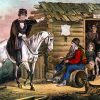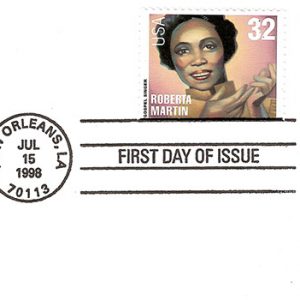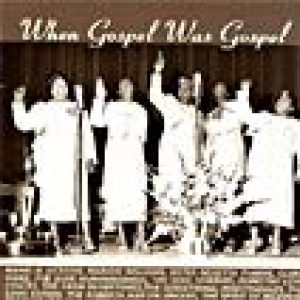calsfoundation@cals.org
Roberta Evelyn Martin (1907–1969)
aka: Roberta Evelyn Winston Martin Austin
Roberta Evelyn Winston Martin Austin was one of the most significant figures during gospel music’s golden age (1945–1960). A performer and publisher, she reached iconic status in Chicago, Illinois, where she influenced numerous artists (such as Alex Bradford, James Cleveland, and Albertina Walker) and had an impact on an entire industry with her innovation and business acumen.
Roberta Evelyn Winston was born in Helena (Phillips County) on February 12, 1907, one of six children of William and Anna Winston, proprietors of a general store. She began studying piano at age six. Her family relocated to Cairo, Illinois, before she was ten, after arriving in Chicago in 1917, Winston played for various church functions, working with Thomas A. Dorsey, the “Father of Gospel Music,” at Chicago’s Pilgrim Baptist Church and eventually becoming choir director at the Windy City’s Mount Pisgah Baptist Church. Mildred Bryant Jones, choral director at Wendell Phillips High School where Winston attended, taught her in piano and choral directing, inspiring Winston later to attend Northwestern University, where she studied piano in anticipation of a career as a classical concert pianist.
While the date of her marriage to William (Bill) Martin and details of their subsequent divorce are uncertain, she was known as Roberta Martin at the onset of her career in the early 1930s.
In 1932, Martin joined Thomas Dorsey and Theodore Frye’s Chicago-based Young People’s Choir, and was eventually employed as the choir’s pianist. A 1933 concert featuring the Bertha Wise Quartet led Martin to develop a new style of her own. That same year, Martin and Frye founded the Martin-Frye Quartet. Later renamed the Roberta Martin Singers, the group’s early members included Robert Anderson, James Lawrence, Norsalus McKissick, Eugene Smith, Romance Watson, and Willie Webb. Martin accompanied the group as pianist but also sang the occasional solo.
In 1947, she married James Austin; they had one son. In spite of a change in surnames, her stage name remained the same throughout her career.
The Roberta Martin Singers were a hit in the 1940s and 1950s, recording for the Apollo and Savoy record labels and earning several gold records. In the early 1940s, female voices—namely those of Bessie Folk and Delois Barrett—were added.
In 1939, Martin established her Roberta Martin Studio of Music, a Chicago-based gospel music publishing house, which distributed her compositions as well as those of James Cleveland, Dorothy Norwood, and Alex Bradford. Among the notable songs Martin published were “He Knows How Much We Can Bear” (1941), “Try Jesus, He Satisfies” (1943), “Only a Look” (1948), “I’m Just Waiting on the Lord” (1953), and “God Is Still on the Throne” (1959).
Though stricken with cancer, Martin reportedly refused painkilling drugs during the time leading up to her death on January 18, 1969, in Chicago, believing that God could perform a miracle. At her funeral, 50,000 black Chicagoans passed through Mount Pisgah Baptist Church to pay their last respects. Martin is buried at Chicago’s Burr Oak Cemetery, where fellow Arkansan and gospel star “Sister Rosetta” Tharpe is buried. Martin was honored posthumously by the Smithsonian Institution in 1981 with a colloquium and by the U.S. Postal Service on July 15, 1998, with a commemorative postage stamp.
For additional information:
Boyer, Horace Clarence. How Sweet the Sound: The Golden Age of Gospel. Urbana: University of Illinois Press, 1995.
Heilbut, Tony. The Gospel Sound: Good News and Bad Times. New York: Simon & Schuster, 1971.
McNeil, W. K., ed. Encyclopedia of American Gospel Music. New York: Routledge, 2005.
Greg Freeman
Southern Edition








Comments
No comments on this entry yet.